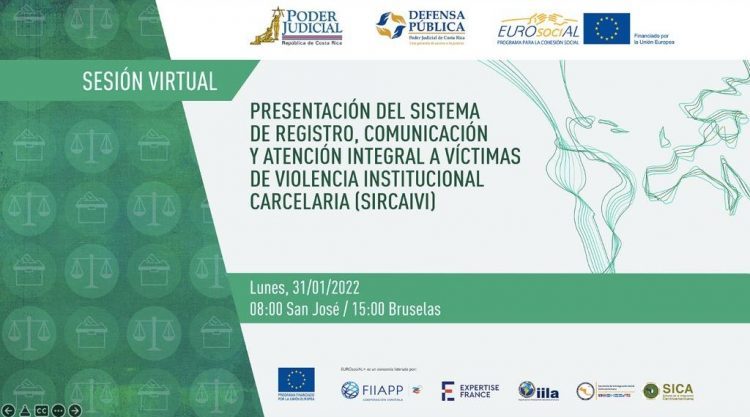This training marks the beginning of the implementation of this system after four years of preparation, based on the initiative of the Inter-American Association of Public Defenders (AIDEF) with the assistance of the European Union’s EUROsociAL+ Programme. The project seeks to settle a historical deficit regarding people in custody in terms of ill-treatment and torture in prisons. Costa Rica, together with Argentina and Chile, is pioneering its implementation.

Training sessions with the Public Defender’s Office, the Public Prosecutor’s Office and Costa Rica’s Judicial Branch Judicial Investigation Body, together with the Ministry for Justice and Peace, and State and civil society institutions inaugurated the Registration, Communication and Comprehensive Care System for Victims of Institutional Prison Violence (SIRCAVI).
During the last ten years, the Costa Rican prison system has experienced a sustained increase in its population. In its visits to prison institutions, the Costa Rican Public Defender’s Office has pointed out that prison overpopulation and overcrowding, in themselves, are a form of cruel and inhuman treatment or punishment. In addition, confinement in these conditions causes, among other things: self-rule in prisons, difficulty in satisfying basic needs, limited access to health services, complex health conditions and the inability of prison authorities to develop job placement programmes and projects.
At the opening ceremony, Fernando Cruz Castro, chairman of Costa Rica’s Supreme Court of Justice, estimated that the system “plays a fundamental role in working to put into practice the protection of intrinsic rights, such as the right to dignity, life, health and access to basic conditions that allow people to adequately serve their sentence. Since it is no secret to anyone that, at present, there is a simmering reality, a reality that shows that prison overcrowding and excessive prison centre populations and the difficulty in satisfying basic needs are situations that afflict the majority of prisons nationwide”.
In this context, as pointed out by the director of the Costa Rican Public Defender’s Office, Juan Carlos Pérez Murillo, “SIRCAIVI is a fundamental tool in the identification, denunciation and follow-up of cases of violence within the context of Costa Rican prisons. Furthermore, in the complaints process, it enables us to provide assistance to victims and relatives who require it. Both in social and legal terms, it analyses and documents the incidence of violent events in the context of prisons, disseminating information and raising awareness to the phenomenon of prison violence. It promotes spaces for dialogue and inter-institutional encounters within our field of activity and allows the development and implementation of training, research and the exchange of experiences.”
On the subject, the Minister for Justice and Peace, Fiorella Salazar Rojas, indicated, “We view the launch of SIRCAIVI very positively, it is a tool that brings the work together because there are many players involved in the prison system, not only internally, but externally, and this guarantees fresh views from independent eyes, from eyes that are not focused on the daily life of the system and thanks to this we could derive a lot of continuous improvement in favour of the prison population. There is a common objective shared by all players involved and it is precisely that of guaranteeing the human rights of the people who are in prisons in Costa Rica.”
The general secretary of FIIAPP, Inmaculada Zamora considered the relevance of the action at the present time “due to the impact that the pandemic is having on the most vulnerable groups and in particular on people in custody regarding their access to rights”.
The EUROsociAL+ experts participating in the design and implementation of SIRCAIVI, Iñaki Rivera Beiras and Alejandro Forero Cuellar, valued the inter-sectoral action of the system with the creation of Inter-institutional Dialogue Tables (MEDAI) that aim to allow maximum use of resources that make effective the principle of comprehensive care for people in custody, such as the provision of legal, medical and psychosocial assistance between institutional players and civil society.
National and international experts will participate in the three-day training session, including the Inter-American Court of Human Rights judge, Nancy Hernández López.



